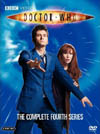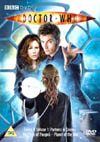The Fires of Pompeii
 |
 |
 |
DVD NTSC
Region 1
14-episode
box set




|
DVD PAL
Region 2
14-episode
box set


|
DVD PAL
Region 2
3-episode volume


|
|
(Doctor Who Story No. 195, starring David Tennant)
- written by James Moran
- directed by Colin Teague
- produced by Phil Collinson
- music by Murray Gold
- 1 episode @ 48 minutes
|
Story: Donna finds herself in an uphill battle
trying to convince the Doctor to warn the citizens
of Pompeii that the nearby Vesuvius mountain is about
to explode and bury the city in less than 48 hours.
The Doctor becomes more
concerned to learn how the population is developing
an uncanny knack for making accurate prophecies, with serious
side-effects on their health. Why is the volcanic eruption
the one event they can't predict? And what powerful
intelligent forces are at work in the mountain itself?
|
|
DVD Extras (box sets only) include:
- Audio commentary by David Tennant (The Doctor),
Catherine Tate (Donna Noble),
and production manager Tracie Simpson.
- Doctor Who Confidential featurette: The Italian Job (9 min.)
with Tennant, Tate,
Phil Cornwell (Stallholder),
director Colin Teague,
producer Phil Collinson,
executive producer Russell T. Davies, and
pyrotechnics technician Danny Hargreaves.
Includes David Tennant's fascinating tour of the actual ruins of Pompeii,
with guide Gaetano Manfredi.
- Deleted Scenes (1 min.) - introduced by
executive producer Russell T. Davies
- TV Trailer
Buyers' Guide Review
by Martin Izsak
|
|
(A more in-depth analysis, containing "SPOILERS" and intended
for those who have already seen the program, can be accessed
here.)
|
Well, this story seems to work MUCH better on repeat viewing than it
did the first time through, so we'll want to examine what it's doing,
or not doing, to create quality anticipation. Will there be an upset
in the ranking? Hmmm.....
Perhaps the first blow against creating quality anticipation is the
unfortunate sequencing of stories and their settings within the broadcast
order.
Predictably, the series feels it has to now introduce Donna to the two
types of settings that the series alternated between in the sixties,
beginning with time travel into history. So we're stuck mucking about with
the Earth for the
fourth story in a row. At least we've left England this time.
The opening shot immediately reveals that the camera started rolling a few
seconds too late to capture a satisfying TARDIS materialization. Easy
points lost, creating the anticipation of a story done on the cheap,
as well as making the story less accessible to those who might be getting
their very first taste of Doctor Who with this episode. Not smart.
As those who remember
"The Masque of Mandragora" (story no. 86)
will attest, there's something about Italy that draws language translation
questions out of the Doctor's companions. The subject is handled
particularly badly here - The TARDIS would indeed be a poor vehicle
to use to explore other cultures if, as suggested here,
it magically wiped out all perception of
the other culture having differences like language, speech patterns,
and the underlying philosophical differences behind such things.
Many of the opening scenes open this can of worms and fail to satisfy,
instead producing an aura suggesting that Donna hasn't really left
modern England.
Yes, we're back to that recurring problem again.
I prefer to believe that, when a story is properly written,
the TARDIS translation mechanisms only fill in whatever raw linguistic
blanks may remain in its passengers' minds. Thus you can still hear
German and French in
"The War Games" (story no. 50), or listen to
the Judoon shift from their own language and actually learn English
through their own translation devices in
"Smith and Jones" (story no. 183).
Of course, there's no reason why a shopkeeper shouldn't be able to
detect a Celtic accent on Donna's Latin, and if the accent is thick enough,
and the TARDIS reluctant enough to intervene, maybe he won't be able to make
out what she's trying to say at all..... If only the story's dialogue
could suggest/promote this explanation of what's going on.....
In terms of the developing story,
what seems to start out as a quaint history lesson quickly adds a bizarre
bit of sci-fi mystery that will keep you guessing.
I say "bit" because, at least on first viewing, it doesn't quite seem to
overshadow a less interesting people drama that sounds weirdly modern
where one would more likely expect Shakespearean dialogue.
Is the writer (or an editing Davies in his reported re-writes) really
able to wrap his mind around a new culture? Is TARDIS translation
going to be the new convenient inexcusable crutch whenever this happens?
If so, I may tune out. I believe there are philosophies currently coming
out in this world that will make the type of open family dysfunctions
and blame-centered dialogue featured here seem very dated,
and very late 20th / early 21st century. Carting it back to Pompeii
in 79 A.D. as a kind of "universal truth" is too pedestrian
and "un-travelled" for this show's intended scope.
The Sybilline Sisterhood draws on the strings of old, worn-out cult
clichés that don't improve the story's watchability.
Although drawing some respectability from its historical basis,
putting it ahead of many similar ideas popular in the Philip Hinchcliffe
era of the show (seasons 12-14),
it's ultimately something hard to take too seriously on today's screen.
Not until the second half of the story does the sisterhood really
prove it has significant worth; before then it predicts a mediocre
level of villainy for the tale.
The character of Lucius is introduced in a scene with probably
far too many people in it at once, and far too many important
story points to get across, probably becoming as much a nightmare to
shoot as the Rivendell Council Meeting scene was in
"The Lord of the Rings: The Fellowship of the Ring". On TV's tight
schedule, Colin Teague doesn't quite do as well as Peter Jackson did,
but manages a fairly good go at it, making at least half of the points
succeed very well.
Lucius himself does not sustain much interest for the story though,
appearing more and more one-dimensional as a character the more we
see of him. On the other hand,
the leader of the sisterhood, once revealed, offers loads of higher
interest, becoming one of the successes of the adventure.
|
The music is excellent once more; thank you Murray. Quite a bit
of it is now being reused from previous stories, and previous seasons,
but that just helps it become more memorable. The music of the
Sybilline Sisterhood is unique for this story, and while not my
favourite bit, is entirely appropriate and works well. Sadly, an enjoyably
pompous brass herald for Lucius and his entourage did not make it
onto the CD, but space was limited.
A few well-done
story beats escalate the plot and keep you riveted,
and we do get a riveting final enemy worthy of making up for
many of the story's earlier shortcomings. If this story ever had
to be split back into the classic format of two 25-minute episodes,
it would have a great cliffhanger....
The sets and artistic design of this story are fairly elaborate
and give the show a nice look, although I'd never have guessed
before seeing behind-the-scenes material
that they left England and went to Rome for the shoot. Partly
I'm probably taking modern set-design ability for granted; partly I don't
think the maximum possible value of being there was brought out
in the footage.
Much of the less than great stuff we found ourselves wading through
at the beginning of the story does pay off later on, making the story
work better as a whole than the first half alone could suggest.
The decisive action for the climax works well on repeat viewing
and looks great on screen, although it did seem a bit too predictable
on first viewing. The coda was actually more interesting than the
climax that first time through....
|
Music by Murray Gold
"The Sybilline Sisterhood",
"Life Among the Distant Stars",
"Corridors and Fire Escapes", and
"Voyage of the Damned Suite"
are available on:
|
"All the Strange, Strange Creatures", and
"The Doctor Forever"
are available on:
|
|
There's much more to be said on the finale and underlying premise of
this story, but you can read about all that in the
In-depth Analysis version
of this review after you've seen the show.
On the whole though, I think this tale has aged better than many other
episodes of this show. The main subject matter remains interesting, the action
is solid, the plot works well, and the visuals are exciting and stunning.
It's got much of what I'd want from a story set on a new planet. Chiefly,
I only want to remove a few of its less successful dialogue passages,
freeing up screen time to strengthen its more promising elements.
This story is definitely an improvement on the previous one, but still
leaves a weird aftertaste.
Perhaps it does deserve to upset the rankings more than before....
This story has become available on DVD.
Click on the Amazon symbol for the location nearest you
for pricing and availability:
 |
 |
 |
DVD NTSC Region 1
14-episode boxed set
for the North American market:
 in the U.S.
in the U.S.

 in Canada
in Canada

|
DVD PAL Region 2
14-episode boxed set
for the U.K.


|
DVD PAL Region 2
3-episode volume
U.K. format only


|
Note: The full season sets
contain commentaries, behind-the-scenes
featurettes, and other extras.
The smaller volumes only feature the plain episodes.
Comments on this article are welcome. You may contact
the author from this page:
Contact page
|










